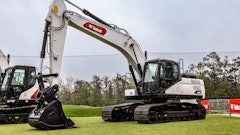
In any successful construction operation, fleet managers need their vehicles and operators in constant peak condition to meet deadlines, stay on budget, and keep their crew as productive as possible. That's where benchmarking comes in. With data at the heart of modern fleet operations, providing essential insights is what separates good fleets from great ones. By systematically comparing vehicle and maintenance data, fleet managers can uncover critical insights and drive significant improvements in operational efficiency: It's like having a secret blueprint for success.
Insights from benchmarking give fleet managers a clear picture of how things such as fuel efficiency, maintenance costs and vehicle utilization compare against other construction projects and industry leaders. With this information, managers can pinpoint improvement areas, whether cutting down on wasteful idling or optimizing routes to save precious minutes.
Understanding Benchmarking in Fleet Management
With fleet management software, the availability of real-time data has made benchmarking more precise and actionable than ever before. When integrated with telematics, fleet management software collects vast amounts of data, ranging from vehicle location and usage patterns to maintenance records and fuel consumption. Think of integrated fleet management software as your fleet's digital black box; it tracks everything from where your trucks are to how they're being driven. This real-time data fuels the benchmarking process, providing hard numbers against which to compare.
Here's how benchmarking can supercharge your construction fleet:
- Spotting gas guzzlers — Benchmarking fuel consumption allows operators and managers to identify vehicles burning more than their fair share, whether due to routing issues, excessive idling, or the need for an operator training program to promote fuel-efficient habits. Studies suggest that 10% to 30% of the fuel used by construction equipment is wasted due to idle time that doesn't contribute to work. Fleet technologies enable fleets to reduce unproductive idle time by an estimated 10% to 15% through actionable idling data, allowing fleets to take action and slash fuel costs.
- Nixing needless service — Surprise breakdowns cost time and money. Benchmarking maintenance schedules helps determine if you're servicing vehicles too often or not often enough. Integrating telematics with fleet management software can also help predict future issues based on sensor data pulled directly from the vehicle, allowing for proactive fixes before issues become major hazards.
- Keeping your crew on the go — Downtime due to parts shortages is a nightmare. Benchmarking helps you optimize inventory counts, ensuring you have the right supplies without getting stuck with a warehouse full of unused parts. This keeps your fleet moving and your crew productive.
- Learning from the best — Benchmarking against top construction fleets reveals their winning strategies. They might be using cutting-edge fleet technologies you haven't explored, or perhaps they've prolonged asset life cycles. By learning from the best, fleet managers can adapt their tactics and elevate their fleet's performance.
Tracking Vehicle Usage
One of the key benefits of successful benchmarking is the ability to track vehicle usage comprehensively. Fleet managers can identify patterns and anomalies that impact operational efficiency by understanding how vehicles are used daily throughout a project or on a job site. Key metrics such as the median cost per mile by industry, average usage duration, and vehicle idle times are crucial for this analysis. For instance, if a fleet's cost per mile is significantly higher than the industry median, it may indicate inefficiencies that need to be addressed, such as suboptimal routing, excessive idling, or inadequate maintenance practices.
On the other hand, fleet management solutions provide detailed insights into these metrics, allowing fleet managers to compare their performance against industry benchmarks. This comparison highlights areas for improvement and helps set realistic performance targets. For example, suppose the industry standard for vehicle utilization is 80%, and a fleet is operating at 70%. In that case, there is a clear goal to strive for, along with specific data to guide the necessary changes.
Maintenance Optimization
Maintenance is a significant cost factor in fleet management, accounting for 22% of fleet costs among users surveyed, second only to fuel at 50%. Because of this, it should be no surprise how optimizing maintenance schedules can lead to substantial savings. Benchmarking plays a critical role by helping fleet managers decide whether to service vehicles based on time in service or mileage. Fleet managers can determine the most cost-effective maintenance strategies by assessing historical service data and comparing maintenance costs, downtime, and standard service expenses against industry benchmarks.
Fleet data provides a wealth of information that can be used to benchmark maintenance practices. Detailed records of service activities, including the frequency and cost of repairs, help identify patterns and predict future maintenance needs. This proactive maintenance approach, guided by benchmarking, helps managers ensure that vehicles are serviced at optimal intervals, preventing costly breakdowns and extending the lifespan of fleet assets.
Practical Application of Benchmarking Insights
The actual value of benchmarking insights lies in their practical application. Fleet managers can use these insights to drive tangible improvements in their operations. This may include the following benefits:
- Cost reductions — By identifying inefficiencies through benchmarking, fleet managers can implement targeted measures to reduce costs. Suppose fuel costs are higher than the industry average; strategies such as optimizing routes, reducing idle times, and improving operator behavior can be employed to bring down these costs. Benchmarking insights also allows fleet managers to assess each vehicle's life cycle cost to determine the most cost-effective replacement schedule.
- Regulatory compliance — Tracking crucial fleet data, including vehicle inspections, emissions compliance and operator hours-of-service regulations, ensures lawful operations and allows for smooth information retrieval during audits or inspections.
- Tailored inspections — Benchmarking can highlight the need for more tailored inspection practices. Comparing the frequency and severity of breakdowns against industry standards, fleet managers can adjust their inspection schedules to catch potential issues before they escalate into costly repairs.
- Trends monitoring — Delving into historical fleet data can uncover hidden trends and recurring patterns. This knowledge empowers managers to make strategic decisions, such as predicting what their fleet will require in future rounds of service, gauging the impact of new technologies, and spotting opportunities to grow or expand.
- Safety enhancements — Leveraging fleet data, managers gain a window into operator behavior and vehicle health. This allows them to identify potential safety risks and recurring patterns. With this knowledge, they can implement targeted measures to prevent accidents and ensure the fleet operates within safety regulations.
- Parts inventory management — Effective parts inventory management is crucial for minimizing downtime and maintenance costs. Benchmarking can provide insights into the optimal parts inventory levels, helping fleet managers balance the cost of holding inventory against the risk of stockouts. Fleets benchmarking against themselves, such as tracking trends in back-ordered parts, parts usage, etc., can implement more efficient inventory management strategies, ensuring that the correct parts are available without tying up excessive capital in inventory.
- Operator performance — Benchmarking can also be extended to assess operator performance. Fleet technologies provide detailed insights into driving behavior, such as speeding and harsh braking and acceleration patterns. Comparing these metrics against industry benchmarks, fleet managers can identify areas for operator training and improvement. This enhances safety, contributes to fuel efficiency, and reduces vehicle wear and tear.
- Competitive edge — The construction industry is so competitive that every advantage matters. Benchmarking helps you identify and implement best practices, keeping you ahead of the curve and giving you the edge to win more bids.
The Path to Fleet Management Mastery
Benchmarking is a powerful tool for enhancing fleet operations. Fleet managers can uncover critical insights that drive continuous improvement by systematically comparing vehicle usage, maintenance practices, and operational performance against industry standards and competitors. Integrating fleet technologies into the benchmarking process makes it more precise and actionable, enabling construction fleet managers to set realistic performance targets and implement effective strategies for cost reduction, maintenance optimization and competitive advantage.
As fleets continue to embrace digital transformation, benchmarking will become increasingly important. It empowers fleet managers with the data-driven insights needed to navigate the complexities of modern fleet operations, unlocking their full potential and achieving operational excellence. Whether tracking vehicle usage, optimizing maintenance schedules, or gaining competitive insights, benchmarking provides the roadmap for success in today's data-driven world.



















